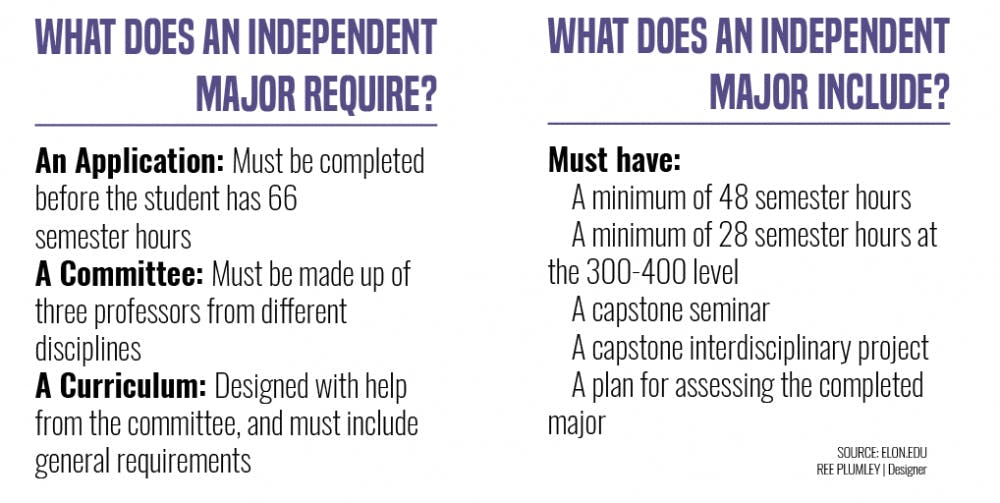The majority of Elon students rely on predetermined major checksheets and degree audits to help them when registering for classes or working out their four-year-plan. But for about 30 Elon students, they rely on a checksheet they created for themselves.
Elon’s independent major program allows students to develop their own path to graduation, with the help of faculty members, by pulling together courses that fit their needs of wanting more than the traditional major.
For sophomore Crystal Sharp, her journey to creating her own major started when an associate professor of German recommended it for her. After discussing her options with Eric Ashley Hairston, coordinator of the independent major program, Sharp decided to pursue a major in German Studies rather than her previous major in English Literature.
“I met with him and I talked about it, and I was like, ‘I could do that,’” Sharp said. “‘I would rather do that than my major that I’m doing now. It seems more interesting to me.”
Sharp’s German Studies major includes German language, history and art history. The three areas of study must be complimentary of each other in order for it to meet the independent major requirements.
According to Sharp, the application for the independent major program is “hefty,” and students wishing to apply must propose a capstone project, as well as submit a tentative schedule with the specific courses they’ll take to complete the major. The process could take a while, as it has to be formally reviewed by the Curriculum Committee.
This extensive process almost forced senior Beth Lester to transfer. When the head of the independent major program at the time wouldn’t get back to her with answers, she started to panic.
“I started looking into other schools, thinking about possibly transferring for the fall of my junior year,” Lester said. “Luckily I didn’t have to do that.”
Despite the frustration it can bring, the application and requirements serve as a purposeful barrier to ensure students are intentional with their major. For that reason, for instance, students can’t have more than 66 completed credit hours when applying.
“They don’t want you basically taking a bunch of classes that you’ve already taken and being like, ‘Here’s this way where I can, like, mix them together,’” Lester said. “They really want it to be something well thought out.”
Unlike Sharp, Lester knew even before coming to Elon that she wanted something like the independent major program. She had an interest in industrial design, but also wanted and valued a liberal arts education.
“Most industrial design programs are not through liberal arts schools because you’re spending so much time in the studio and you’re building a portfolio and you’re getting ready to go out and work in the workforce,” Lester said. “There’s much less of a focus on pursuing other passions.”
Lester’s industrial design studies major displays the interdisciplinary aspect of creating a unique major. While her major primarily draws from engineering and art, it also includes courses in art history, computer science, physics and math.
After graduation, Lester will continue her education at Northwestern University, as she pursues a master’s degree in engineering design.
“The program focuses on going through the process of coming up with an idea and bringing it to fruition, which is super exciting,” Lester said.
As for Sharp, her major could take her in a few different directions. She hopes to either teach English in a German-speaking country, go to graduate school and become a professor or work as a liaison between U.S. and German companies.
While creating your own major can be difficult at times, Lester just wants students to be aware of the opportunity.
“You can explore the option,” Lester said. “If you have something unique that you want to pursue that we don’t have here, you can.”


